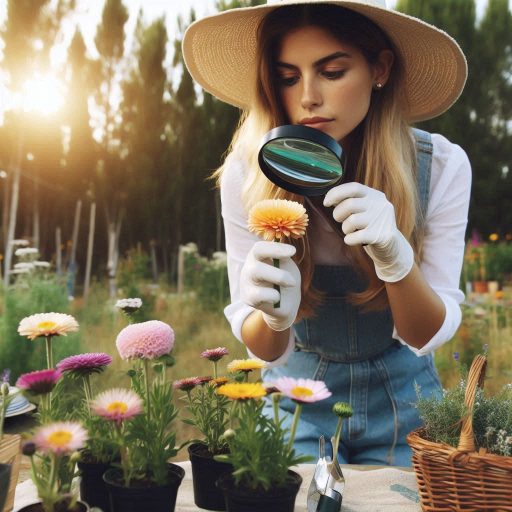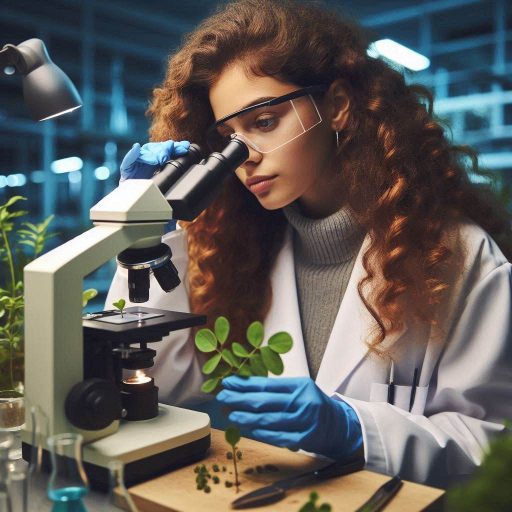Introduction
Excelling as a botanist requires mastering key skills essential for success in the field.
Botanists play a crucial role in studying plants, understanding their growth, and analyzing their relationship with the environment.
Their work is critical for environmental conservation, agriculture, and scientific research.
Why Skills Matter in Botany
To thrive as a botanist, you need more than just a passion for plants.
Specific abilities enable botanists to conduct research, manage ecosystems, and contribute to environmental solutions.
Key responsibilities of botanists include:
- Studying Plant Growth: Monitoring how plants develop under various conditions.
- Analyzing Plant-Environment Relationships: Understanding how ecosystems affect plant health and vice versa.
- Conducting Experiments: Developing solutions to agricultural and ecological challenges.
Essential Skills for Botanists
The right combination of skills ensures efficient research and career growth:
- Attention to Detail: Identifying subtle changes in plant behavior.
- Problem-Solving Skills: Addressing environmental and agricultural issues.
- Communication Skills: Sharing research findings effectively with peers.
- Fieldwork Ability: Working outdoors under different weather conditions.
Mastering these skills enables botanists to contribute meaningfully to scientific advancement and environmental sustainability.
Strong Background in Biology
To excel as a botanist, a strong background in biology is essential.
This foundation gives you the knowledge to understand the intricate workings of plant life.
Whether you‘re studying the growth of plants in a controlled environment or observing them in the wild, biological principles are at the core of every process.
The Importance of a Solid Foundation in Biology for a Botanist
Having a deep understanding of genetics is crucial for botanists.
Genetics allows you to comprehend how plants inherit traits, evolve, and adapt.
This knowledge helps in everything from breeding new plant varieties to conserving endangered species.
Botanists often use genetic techniques to explore plant diversity, identify species, or develop plants that are more resilient to environmental changes.
Ecology, another vital aspect of biology, plays a significant role in a botanist’s work.
Understanding how plants interact with their environment, and other species, is key to protecting ecosystems.
Botanists rely on ecological principles to evaluate the impact of environmental factors like climate change or human activity on plant communities.
This knowledge is crucial when planning conservation efforts or restoring damaged habitats.
Plant physiology is the study of how plants function at a molecular and cellular level.
For a botanist, mastering this concept is fundamental.
Understanding plant physiology enables botanists to examine how plants absorb nutrients, respond to stress, and perform photosynthesis.
With this knowledge, botanists can develop methods to enhance crop production or address issues like plant diseases.
Physiological insights can also help create solutions for improving plant health and productivity in agriculture.
The Need for Understanding Basic Biological Concepts such as Genetics, Ecology, and Physiology
In addition to these core biological areas, botanists must grasp the principles of evolution and natural selection.
Knowing how plants evolve over time allows botanists to make informed decisions about plant conservation.
It also helps predict how plants might respond to changing environmental conditions.
This evolutionary perspective ensures that botanists can contribute to sustaining biodiversity in the face of challenges like habitat destruction.
A strong foundation in biology is not only important for research but also for practical applications.
Whether you’re working in a lab, conducting fieldwork, or advising policymakers on environmental issues, biological expertise is your guide.
It equips you to approach complex problems with a well-rounded understanding of plant life.
For any botanist, mastering basic biological concepts like genetics, ecology, and physiology provides the necessary tools to succeed in this dynamic and impactful field.
Without a solid grasp of biology, a botanist’s ability to contribute meaningfully to the field would be limited.
This foundational knowledge unlocks a world of possibilities for advancing our understanding of plants and their role in sustaining life on Earth.
Plant Identification Skills
Accurate plant identification is one of the most critical skills a botanist must possess.
Recognizing different plant species is essential for understanding ecosystems, conducting research, and ensuring conservation efforts are effective.
Without the ability to identify plants correctly, a botanist’s research or fieldwork could be compromised, leading to inaccurate data and misguided conclusions.
The Significance of Being Able to Accurately Identify Different Plant Species
Plant identification helps botanists distinguish between native and invasive species.
Knowing this is crucial when assessing environmental impacts or devising management strategies.
A botanist’s work often depends on pinpointing the exact species in question, whether for medical research, agricultural applications, or biodiversity studies.
The Use of Field Guides, Keys, and Other Tools to Aid in Plant Identification
Field guides play an indispensable role in helping botanists identify plants.
These guides provide essential details about the physical characteristics of plants, such as leaf shape, flower structure, and stem type.
Botanists use field guides to make accurate comparisons and classifications when working outdoors or in unfamiliar environments.
Another valuable tool for plant identification is the dichotomous key.
This key is a step-by-step tool that leads botanists through a series of questions to narrow down the plant species.
Each question is based on observable traits like leaf arrangement, flower color, or stem texture.
By following this process, botanists can systematically eliminate unrelated species and arrive at the correct identification.
In addition to field guides and keys, technological advancements have made plant identification more efficient.
Mobile apps and digital tools now allow botanists to take photos and analyze plant species instantly.
These apps often rely on databases that catalog thousands of plants, providing an additional layer of accuracy and ease.
However, while technology is helpful, it should complement, not replace, traditional identification methods.
Learning to identify plants is not just about memorization; it requires field experience.
Botanists spend countless hours observing plants in various habitats, noting their unique characteristics, and developing a keen eye for detail.
The more time spent in nature, the better botanists become at recognizing subtle differences between species.
Understanding regional variations is also crucial in plant identification.
A botanist working in tropical rainforests needs a different set of identification skills than one working in temperate woodlands.
Familiarity with local species is key to making accurate identifications and providing valuable contributions to research.
Essentially, plant identification skills are vital for any botanist looking to excel.
By mastering field guides, dichotomous keys, and leveraging modern tools, botanists ensure their research is precise and impactful.
Success in this area often begins with a deep understanding of the natural world and a commitment to continuous learning.
species and contribute to the field of botany.
Read: The Impact of Technology on the Chemist Profession in the US
Data Analysis and Research Skills
Botanists rely heavily on data analysis and research skills to drive scientific discoveries.
To excel in this field, you must be adept at collecting, analyzing, and interpreting data, as these tasks form the backbone of botanical research.
The Necessity of Being Able to Collect, Analyze, and Interpret Data for Botanical Research
In botany, data collection is the first critical step in research.
Botanists gather information from various sources, including field observations, laboratory experiments, and environmental surveys.
Accurate data collection ensures that your research is credible and reliable.
Whether you‘re studying plant growth, disease resistance, or environmental interactions, precise data is essential.
Without strong data collection techniques, your research findings may lack validity.
After gathering data, the next step is analyzing it.
Data analysis involves using statistical tools and software to make sense of the information you‘ve collected.
As a botanist, you need to identify patterns, correlations, and trends within your data.
For example, you may want to analyze how specific environmental factors influence plant behavior.
Being skilled in data analysis allows you to draw meaningful conclusions from complex datasets.
Furthermore, strong analytical skills help you make evidence-based decisions in your research projects.
Interpreting data is equally crucial for botanists.
It‘s not enough to collect and analyze data; you must also be able to interpret the results accurately.
Interpretation involves understanding what the data means in the context of your research questions.
For instance, if your data shows that certain plants thrive in particular soil conditions, you need to explain why this happens.
Your ability to interpret data effectively can lead to new insights into plant biology, helping you advance in your career.
The Importance of Being Able to Design and Conduct Experiments Related to Plant Biology
In addition to data analysis, designing and conducting experiments is fundamental to botanical research.
Successful botanists know how to create experiments that test specific hypotheses related to plant biology.
For example, you might design an experiment to test how different fertilizers affect plant growth.
A well-designed experiment is essential for producing valid, reproducible results.
Poor experimental design can lead to inaccurate conclusions, wasting time and resources.
Conducting experiments also requires precision and attention to detail.
You must follow strict protocols to ensure the accuracy of your results.
This includes controlling variables, replicating experiments, and documenting your methods thoroughly.
Mastery of experimental design not only strengthens your research but also enhances your credibility within the scientific community.
In short, data analysis and research skills are vital for any botanist.
Whether you‘re interpreting data or designing experiments, these skills allow you to make informed discoveries in plant biology.
Developing strong data analysis and research capabilities will help you thrive in the ever-evolving field of botany.
Read: US Chemistry Conferences and Symposiums to Attend in 2024
Transform Your Career Today
Unlock a personalized career strategy that drives real results. Get tailored advice and a roadmap designed just for you.
Start Now
Communication Skills
The Importance of Effective Communication Skills for Presenting Research Findings and Collaborating with Colleagues
As a botanist, possessing strong communication skills is essential for success.
Whether presenting research findings or collaborating with colleagues, clear and effective communication plays a crucial role.
Botanists frequently work with other scientists, government agencies, or even the general public.
You must articulate your findings, share your expertise, and explain complex scientific concepts in an accessible way.
Communication skills also come into play during collaboration with colleagues.
Botanists often work in teams, whether in a laboratory, field research project, or conservation initiative.
Successful collaboration depends on clear and concise communication.
Misunderstandings can delay projects or lead to errors in research, so it‘s important to articulate your thoughts and listen actively to others.
The Need for Writing Research Papers, Giving Presentations, and Attending Conferences
One of the key areas where communication skills are vital is writing research papers.
As a botanist, you are likely to conduct significant research, often leading to new discoveries.
These findings need to be documented and shared within the scientific community.
Writing high-quality research papers ensures that your work contributes to the broader knowledge base.
Effective writing allows other scientists to understand your methods, replicate your experiments, and build on your discoveries.
Clarity and precision in writing help make your research impactful.
In addition to writing research papers, botanists often give presentations.
Whether presenting at conferences, seminars, or workshops, your ability to communicate your ideas is essential.
A well-structured presentation can help engage your audience and make your research stand out.
Using visual aids, such as slides or charts, enhances the clarity of your message.
Presenting research findings to an audience of peers can lead to valuable feedback and collaboration opportunities, advancing your career.
Attending conferences is a regular part of a botanist‘s life.
These events offer a platform for sharing ideas, networking with colleagues, and staying updated on the latest research.
At a conference, you might present your work, engage in panel discussions, or simply interact with fellow scientists.
Each of these activities requires strong verbal communication.
Conferences are opportunities for professional growth, and the ability to effectively convey your ideas can lead to new collaborations or research opportunities.
Read: Key Roles and Responsibilities of a Chemist in the US
Problem-Solving Abilities
In botany, problem-solving abilities are essential for navigating the complex challenges that arise in the field.
Botanists often deal with unpredictable issues that require critical thinking and creative solutions.
Their work extends far beyond simply identifying plants; it involves tackling intricate problems related to plant health, climate change, and biodiversity conservation.
Without strong problem-solving skills, progress in these areas would be severely limited.
The Importance of Being Able to Think Critically and Solve Complex Problems in the Field of Botany
One of the most pressing challenges botanists face is managing plant diseases.
Diseases can devastate ecosystems, disrupt agriculture, and threaten food security.
Botanists must identify the cause of these diseases and develop strategies to mitigate their impact.
This requires analyzing data, experimenting with solutions, and applying knowledge from various fields like microbiology and chemistry.
Through this process, botanists solve problems that have real-world implications for both the environment and human society.
Climate change adds another layer of complexity to a botanist’s work.
As temperatures rise and weather patterns shift, plant species must adapt or risk extinction.
Botanists are on the front lines, studying how different species respond to these changes and identifying ways to help them survive.
This involves critical thinking and problem-solving, as each species may react differently to environmental shifts.
Botanists must develop new conservation strategies, often with limited resources and time, to ensure that plants continue to thrive.
How Botanists Often Face Challenges Related to Plant Diseases, Climate Change, and Conservation Efforts
Conservation efforts present their own set of challenges for botanists.
As human activity threatens natural habitats, botanists work to preserve plant species and ecosystems.
However, this task is not straightforward.
Botanists must consider various factors, such as the needs of the local environment, community interests, and the delicate balance of ecosystems.
In many cases, they must devise innovative solutions to restore damaged habitats, reintroduce species, or protect endangered plants.
This requires both a deep understanding of ecological systems and the ability to think critically about how to apply that knowledge effectively.
In every aspect of their work, botanists rely on problem-solving to make informed decisions.
Whether they’re addressing plant diseases, adapting to climate change, or conserving ecosystems, the ability to think critically and solve complex problems is crucial.
These skills enable botanists to contribute meaningful solutions to some of the most urgent environmental issues we face today.
Without them, progress in botany‘and by extension, in preserving the planet‘would be impossible.
In a nutshell, problem-solving is a foundational skill for botanists, essential for overcoming the field’s numerous challenges and making a positive impact on the environment.
Read: Earning Potential: Chemist Salaries Across US States
Fieldwork Experience
The Value of Hands-On Experience in the Field for a Botanist
Fieldwork experience plays a crucial role in a botanist’s career.
It allows botanists to gain hands-on experience in real-world environments.
Understanding plant life requires more than theoretical knowledge; it demands practical application.
Botanists must immerse themselves in the field to truly grasp plant behaviors and ecosystems.
Conducting field surveys is one of the primary responsibilities of a botanist.
During these surveys, they observe plant species in their natural habitats.
This direct observation helps them understand the environmental factors affecting plant growth.
It also aids in identifying plants and recognizing their unique characteristics.
Importance of Conducting Field Surveys, Collecting Samples, and Observing Plant Behavior in Their Natural Habitats
Collecting samples is another essential aspect of fieldwork.
Botanists gather specimens from various locations to study their traits in detail.
They often collect leaves, flowers, seeds, and even soil samples.
This variety provides a comprehensive understanding of the plant’s biology and ecology.
Sample collection is vital for research, as it allows for laboratory analysis and comparison.
Observing plant behavior in their natural habitats is critical for understanding ecological dynamics.
Botanists note how plants interact with their environment and other organisms.
They examine how factors such as light, water, and soil quality influence plant health.
These observations reveal valuable insights into species adaptation and survival strategies.
Fieldwork also fosters essential skills for botanists.
Effective communication is crucial when working with teams in the field.
Botanists must convey their observations and findings clearly.
They often collaborate with ecologists, conservationists, and researchers.
This teamwork enhances their understanding of plant ecology and conservation efforts.
Moreover, fieldwork teaches botanists to adapt to changing conditions.
Weather can be unpredictable, and botanists must remain flexible.
They learn to navigate challenges, whether it‘s rough terrain or sudden storms.
This adaptability is crucial for success in their field.
Additionally, field experience builds problem-solving skills.
Botanists frequently encounter unexpected situations, such as identifying unknown species.
They must think critically and creatively to find solutions.
This skill set not only applies to their research but also to everyday challenges.
In essence, fieldwork experience is invaluable for botanists.
It enriches their understanding of plants and ecosystems.
Through conducting surveys, collecting samples, and observing plant behavior, they develop essential skills.
These experiences enhance their knowledge and prepare them for successful careers in botany.
Without hands-on field experience, a botanist‘s training remains incomplete.
Embracing fieldwork ensures they become competent and insightful professionals in the botanical sciences.
Adaptability and Patience
The Need for Botanists to Adapt to Changing Environments and Fluctuating Conditions
Botanists work in dynamic environments.
They study plants in various ecosystems, from rainforests to deserts.
Every setting presents unique challenges.
Adaptability allows botanists to thrive amid these challenges.
They must quickly adjust to changing weather conditions and unexpected events.
For instance, a sudden storm can alter their research plans.
Botanists need the skills to modify their methods on the fly.
Environmental conditions can fluctuate dramatically.
Droughts, floods, and temperature changes can impact plant growth.
Botanists must recognize these shifts and adapt their approaches accordingly.
They may need to change data collection methods or adjust their research focus.
This flexibility enhances their ability to gather accurate information.
It also allows them to remain effective researchers despite unpredictable conditions.
The Importance of Patience in Conducting Long-Term Studies and Experiments
Patience plays a crucial role in a botanist’s work.
Many studies require long-term observation and analysis.
A botanist may study a plant’s growth over several seasons.
This research often reveals critical insights into plant behavior and ecology.
However, waiting for results can test one’s endurance.
Botanists must remain committed to their studies over time.
Long-term experiments also require consistent monitoring.
Botanists often return to study sites for years.
They meticulously collect data to ensure accuracy and relevance.
This dedication helps them identify trends and patterns in plant life.
A single season may not reveal the complete picture.
Patience allows botanists to build a comprehensive understanding of their subjects.
Adaptability and patience are interlinked skills.
A botanist may encounter unexpected obstacles during a long-term study.
They must adapt to these challenges while maintaining focus on their goals.
This balance requires mental resilience and emotional fortitude.
Botanists often face setbacks in their research, but persistence is key.
Moreover, collaboration with other scientists enhances adaptability.
Working in teams allows botanists to share knowledge and experiences.
They can learn from each other‘s challenges and solutions.
This collaboration fosters innovative approaches to problem-solving.
It also encourages the exchange of ideas, leading to more effective research strategies.
In short, adaptability and patience are vital for botanists.
These skills enable them to navigate changing environments and conduct thorough studies.
By embracing flexibility, botanists can respond effectively to challenges.
Their patience ensures that they gather valuable insights over time.
Together, these qualities empower botanists to excel in their field.
Gain More Insights: Career Prospects and Job Outlook for Nanotechnologists
Find Out More: Anthropology in the Digital Age: Challenges and Opportunities
Conclusion
Excelling as a botanist requires a unique blend of skills and dedication.
A botanist must possess strong observational skills.
This ability helps them identify plant species and understand their behaviors.
Additionally, critical thinking skills are essential for solving complex problems related to plant health and ecosystems.
Botanists often analyze data and draw conclusions from their research.
Effective communication skills also play a crucial role in a botanist’s success.
They frequently present findings to diverse audiences.
This includes fellow scientists, policymakers, and the public.
Clear communication fosters collaboration and enhances the impact of their research.
Moreover, teamwork is vital.
Botanists often work with other scientists and environmentalists on projects.
Collaborative efforts can lead to groundbreaking discoveries and solutions.
Attention to detail is another critical skill.
Botanists must carefully observe minute differences between species.
They also need to document their findings accurately.
A meticulous approach ensures that their research maintains integrity and credibility.
Furthermore, adaptability is essential in the ever-evolving field of botany.
New challenges, such as climate change, require botanists to adjust their methods and approaches continually.
[E-Books for Sale]
The Big Book of 500 High-Paying Jobs in America: Unlock Your Earning Potential
$19.99 • 500 High-Paying Jobs • 330 pages
Explore 500 high-paying jobs in America and learn how to boost your career, earn more, and achieve success!
See All 500 High-Paying Jobs of this E-Book
1001 Professions Without a Degree: High-Paying American Jobs You Can Start Now
$19.99 • 1001 Professions Without a Degree • 174 pages
Discover 1001 high-paying jobs without a degree! Unlock career tips, skills, and success strategies for just $19.99!




